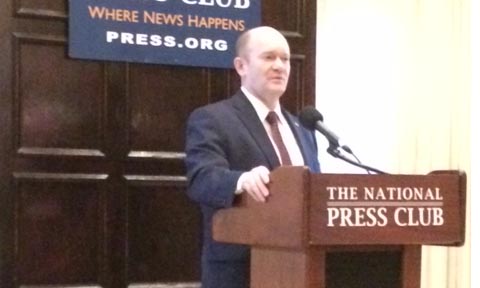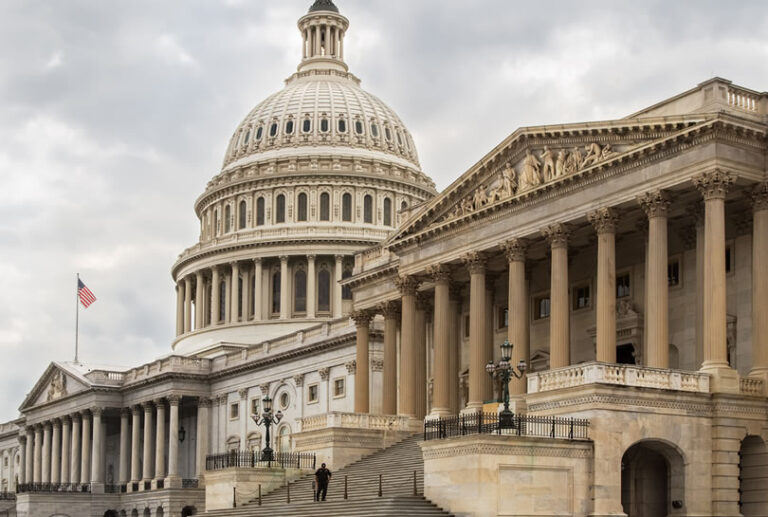Nov. 28, 2018 — When it comes to healthcare in the United States, “we’ve got a lot of work to do in promoting transparency, bringing down cost, and making sure we are tying reimbursement to value of care rather than quantity of care,” Sen. Chris Coons (D-Del.) told attendees of the Coalition for Healthcare Communication’s “2018 Post-election Conference on Healthcare Policy,” held Nov. 26-27 in Washington, D.C.
The drug cost challenge is being championed by the Trump administration, which recently proposed a mandate for drug companies to include the drug list price in direct-to-consumer (DTC) television ads. Industry argues this would be misleading to consumers because the list price does not reflect the actual prices consumers pay for drugs.
When asked about this, Coons said that although he frequently hears from his constituents about price transparency, the recent proposal is “not aligned” with those concerns.
“The price that consumers ultimately pay and the list price are significantly disconnected. … I am concerned about broadcasting on national advertisements list prices that are dramatically different from what the vast majority of patients will actually pay, and how that might impact ability and willingness to access care,” Coons told the CHC conference audience.
“There is also a lot we can do to figure out how list prices [are discounted] and how some other intermediaries between pharmaceutical manufacturers and consumers drive up prices,” he said.
“I do think we have to improve price transparency, but I am not convinced [Department of Health and Human Services] Secretary Alex Azar’s proposal around [DTC] ads is the right way to do it.” Coons said. He welcomed input on the right way to help promote price transparency, and noted that he is a co-sponsor of the Spike Act, which would “require companies to explain sudden, exorbitant price hikes – I think there is no disinfectant like sunshine, particularly on that issue.”
Coons shared that his constituents are worried about “transparency, about what treatment they are going to get, who is going to pay for it, what it’s going to cost, how long it’s going to take and what’s the best setting.”
He said that the United States has “absolutely the best healthcare on the planet, but it is not uniformly accessible to all Americans, and we have too many Americans who are forgoing care either because of their deductibles or their perceived risk of being billed.”
If the administration is serious about lowering drug prices, Coons suggested, “there might be some room to collaborate, but there are a lot of unanswered questions.”
In his keynote presentation to CHC, Coons also praised the biomedical industry for its long-term success in innovation.
“I recently went to the Nobel Prize reception at the Swedish embassy. … We have more Nobel Prizes in particular in medicine and physiology than any other nationality. We have more clinical trials underway, we have more patents, we have more Nobel Laureates, [and] we have more investment in innovation bolstered by an incredible constellation of universities and hospitals than any other country.”
If any illness is to be treated or cured, “that cure is more likely to be found in the United States than in any country on earth, and that is worth celebrating,” he said.
However, our country has “a lot more to do for end-of-life care,” Coons said, reflecting on his experience losing his father and other family members and seeing “both the best and worst of end-of-life care – its cost, its professionalism, its engagement and some of the values and challenges” it presents. “We spend a huge amount in the last few weeks of life within the total spend of Medicare, and for a significant number of Medicare patients, they may not be getting the type of care that they want or that they need, in terms of striking the balance between quality of life and length of life.”
To that end, Coons is a cosponsor of the “Medicare Choices and Empowerment Protection Act,” which would give Medicare beneficiaries a one-time $75 incentive to meet with a healthcare provider to make a decision – in advance – about their end-of-life care.
Coons, who has worked across the aisle during his tenure in the Senate, said the 2018 mid-term election was a tough one for him, because a number of his moderate, business-friendly Democratic colleagues departed, as did as “a number of my key partners in the Republican caucus,” including Sen. Bob Corker (R-Tenn.), Sen. Jeff Flake (R-Ariz.), and the late Sen. John McCain (R-Ariz.).
He indicated that the post-midterm election Senate likely would be taking up issues related to the state of the Affordable Care Act. “President Trump invested in repealing the ACA, and repeal failed by a very narrow margin,” Coons stated. “While the majority leader said he would bring that back up, in a true ‘lame duck’ session, I doubt it.”
He suggested that legislators likely will have to recognize “that there is a lot of rhetoric on both sides, but very few solutions.” With a Democrat-controlled House and a Republican-controlled Senate, he said, “we have two choices” regarding the ACA: “(1) Beat it senseless; or (2) stabilize the marketplace, and accept that the pre-existing condition protection is wildly popular with the American people.”
He added that it is clear that “core pieces of the ACA are here to stay, and [we need to develop] legislative ways to stabilize it.” He noted that “there are a lot of things we can fight about and a lot of things we can agree on.”




